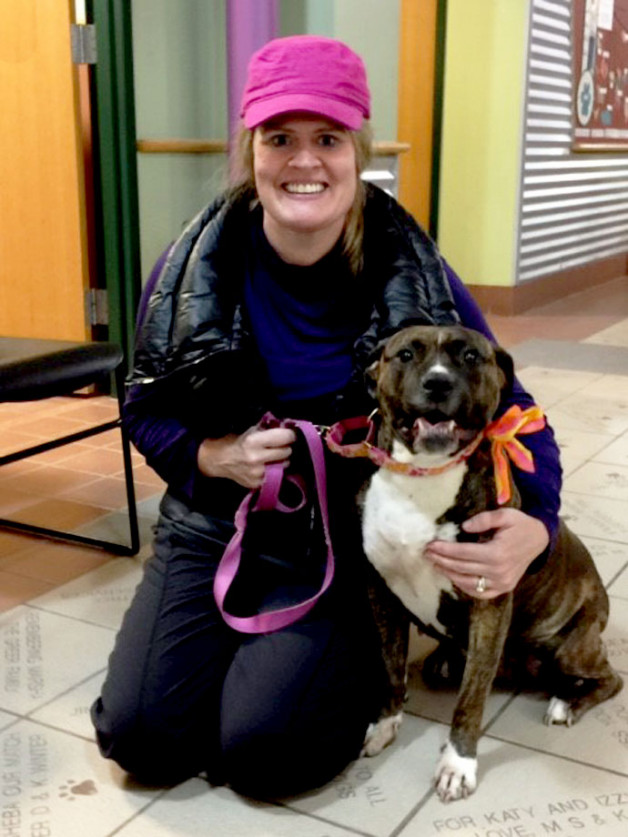Sheila adopted her Pet Partner from the Dane County Humane Society – Betty, a seven-year-old Boxer-Pit mix. Shelia says, “It was love at first sight and we love her more every day.” Betty loves children, so they are hoping to take advantage of that quality in their therapy career. Sheila says it is important to her to visit the VA hospital.
Sheila’s house is full of animals, as they own finches and Lydia, an adopted 11-year-old Italian Greyhound. They also foster “a variety of dogs and critters for DCHS.”
Aside from volunteering at DCHS, Sheila enjoys yoga, painting shabby chic furniture, and any Badger sporting event.
Viewpoint from a member:
A lot to learn – my mentors have taught me so much
Before joining Dogs On Call, I had volunteered for 10 years in shelters and fostered for various rescue organizations. So I kinda thought I knew a lot.
Now, I realize now how much Pet Partners and my DOC mentors have taught me!
Todd coached me:
- Always keep my dog close and my number-one focus. While we were on campus and a slightly more relaxed environment, he was teaching me important habits that are essential to advocating for my dog in every environment. This has been particularly helpful for Betty and me during hospital visits.
- Your dog may require a greater distance from other working therapy dogs. Advocate for that space and avoid events that aren’t conducive to spreading out.
Karen P has been so valuable setting Betty and me up for success in nursing homes and hospitals. A few lessons I’ve learned from Karen:
- Look for new areas and groups to visit. Keep it interesting and spread the love.
- Assess every situation and room to see what modifications can be made to allow the patient the greatest access to your dog. Many patients have physical limitations and it’s important to be creative while still following rules.
- Don’t be afraid to acknowledge that your dog excels in some visit situations and isn’t so great in others.
While participating in the Barnes and Noble event, I gained expertise and advice from Artie, Karen S (Zombie’s Mom), and other patient and kind experienced handlers:
- Reset the environment. If your dog seems anxious, temporarily remove them from the area. Give them a potty, exercise, or sniff break, and some 1-on-1 reassurance.
- Don’t become discouraged if your dog isn’t immediately acting like the perfect therapy dog. It. Is. A. Dog. Every handler has a story of a less than ideal experience.
- They reinforced how the handler’s number-one responsibility is always to
advocate confidently and quickly for their dog.
I’m sure I have a lot more to learn, but Betty and I are having fun, and we are extremely appreciative of the support from the Dogs On Call teams.
For more Sheila and Betty:

